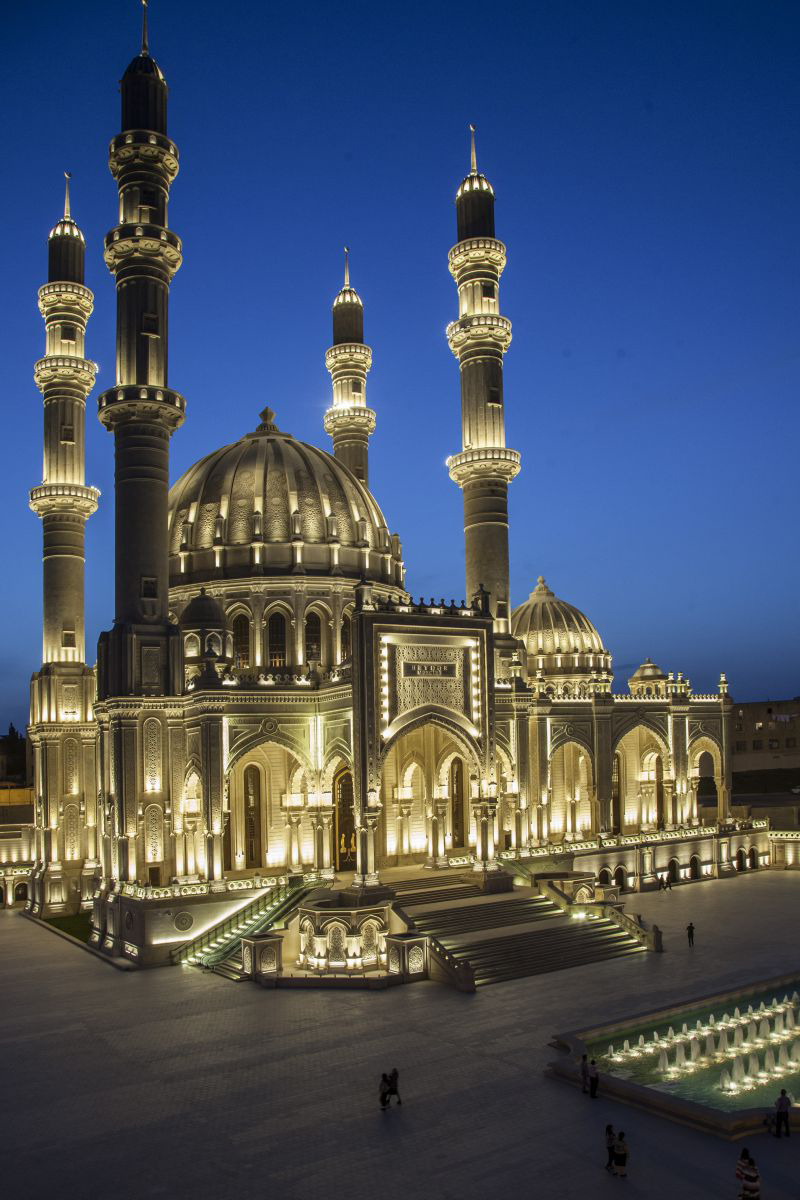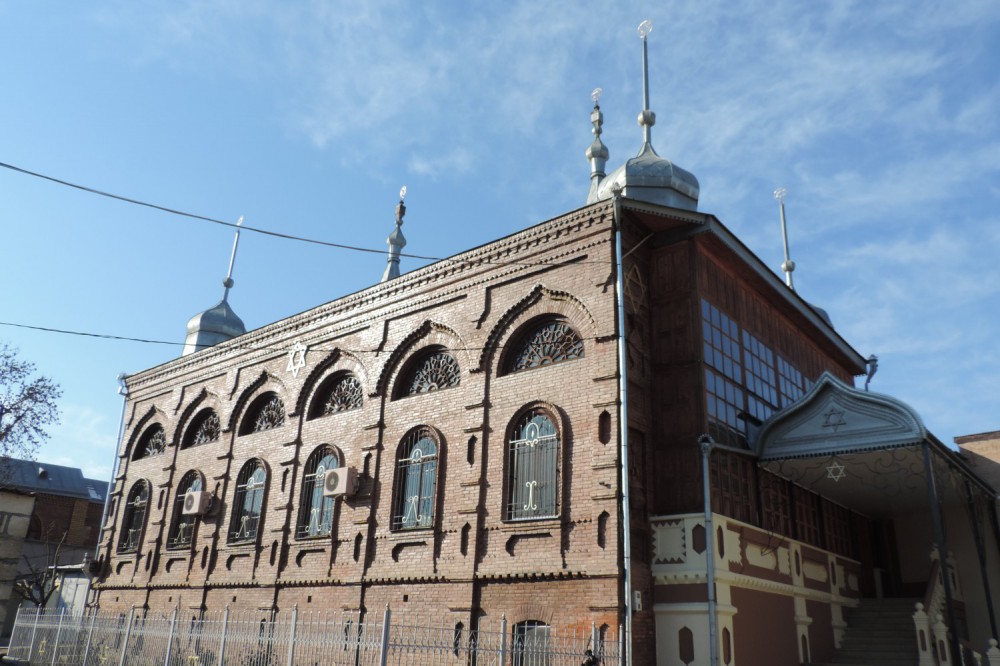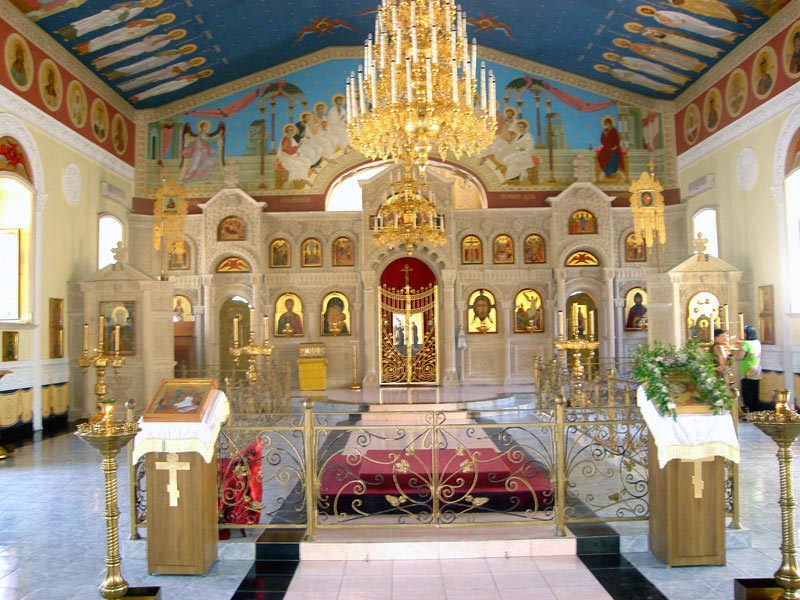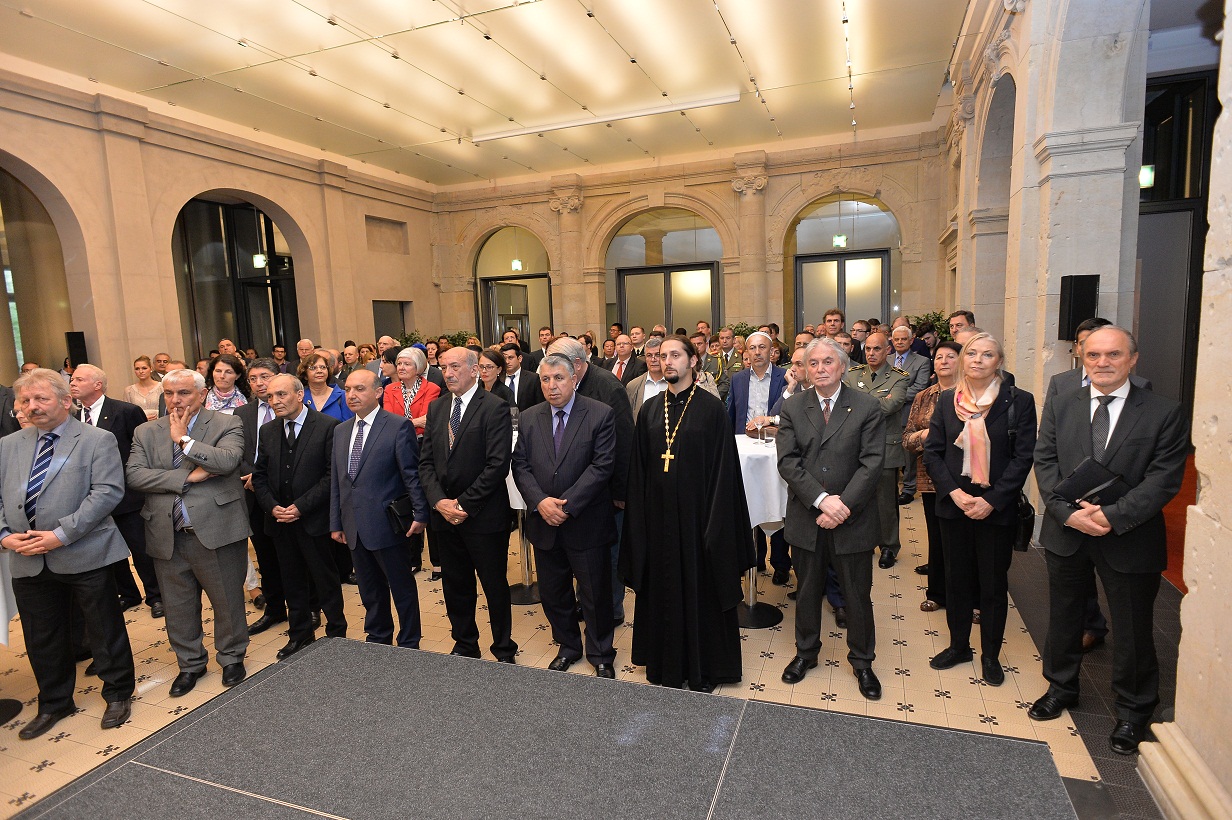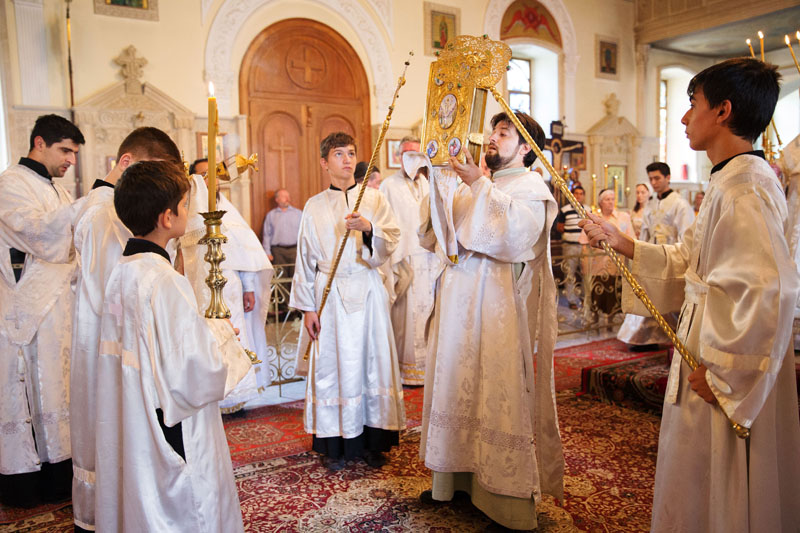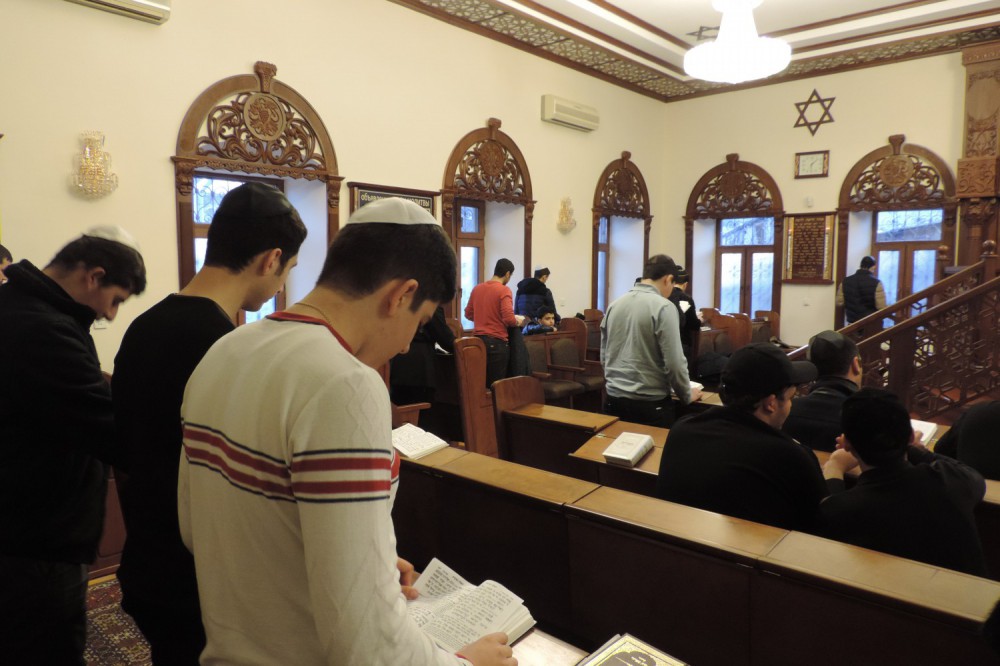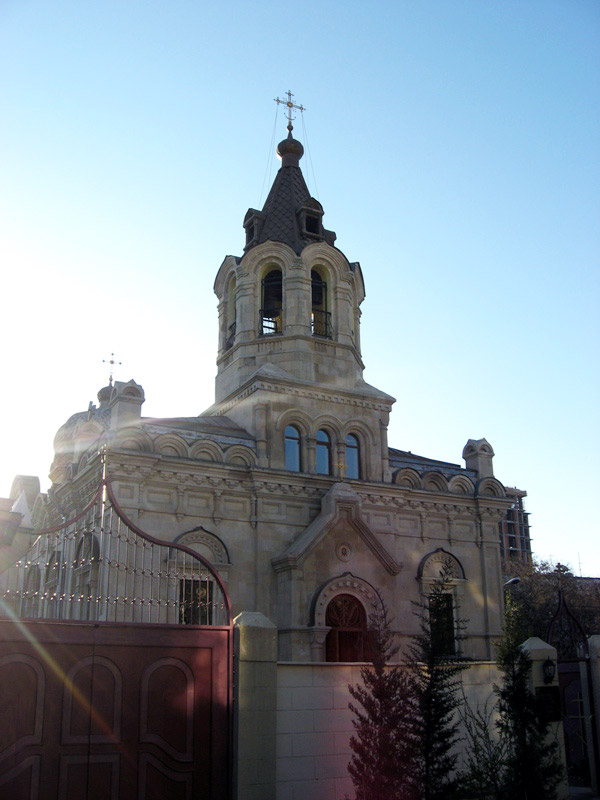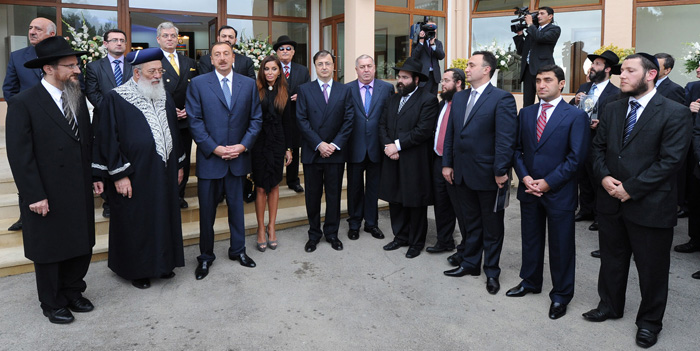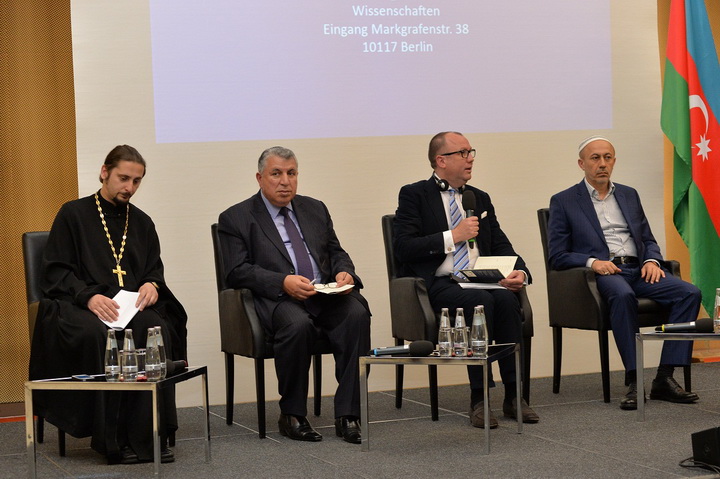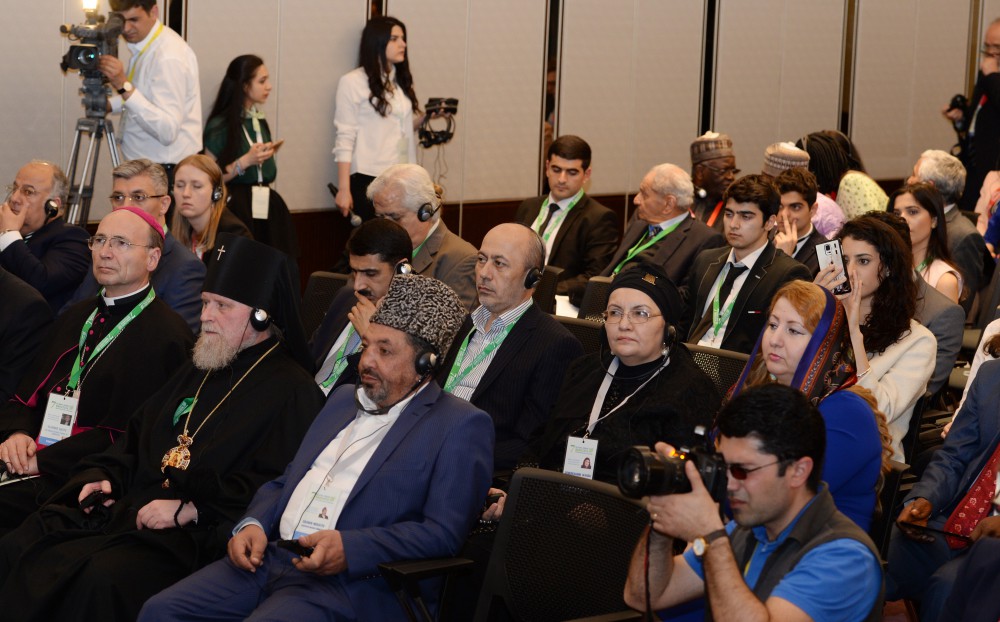Features of historical development of Azerbaijan, its geographical position, ethnic structure of the population have created necessary conditions for existence of different religions in this territory. At various times in the country, in a varying degree there extended heathenism, Zoroastrianism, Judaism, Christianity, Islam and many other religious trends side by side, having mutual impact on one another.
In the Republic of Azerbaijan, there are various religious faiths, but Islam became the dominating religion. Islam, arisen on the Arabian Peninsula in the early 7th century shortly was widespread in many parts of the world including in Azerbaijan. More than 95 percent of the population of Azerbaijan is Moslem.
The history of Christianity in Azerbaijan practically begins with emergence of the Albanian church. In general, this church holds a specific place in the history of Christian religion. The territory of the Caucasian Albania is considered one of the places of origin of the first Christian communities. Registration of the Alban-Udi Christian religious community is a significant event on its character, contents, religious and political importance. Orthodoxy, Catholicism and Protestantism, as well as various sectarian communities present the Christianity in Azerbaijan. Orthodoxy started to spread in Azerbaijan since the early 19th century because of the “resettlement policy” pursued by the Tsarist Russia in this region. The first Roman Catholic parish in Baku has appeared in the 50s of the 19th century in connection with the exile of the military Catholics by the Tsarist Russia to the Caucasus. The Lutheranism became the first Protestant sect widespread in Azerbaijan. Emergence of Lutheranism in Azerbaijan is connected with resettlement in the first half of the 19th century of Germans and Poles in the South Caucasus.
Azerbaijan along with being one of the first human settlements, is also the territory of formation of the culture of tolerance and the cradle of tolerance.This fact gives strong grounds to say that the traditions of tolerance created in Azerbaijan throughout the millennia have gained new lines over time and became the main quality of the people living in this geographical space.
Regulation of the relations between the state and religion in the country, achievement of stability in the religious sphere, preserving the atmosphere of tolerance among the faiths at the national level is connected with the name of Heydar Aliyev. After he came for the second time to the power, the atmosphere of tolerance in the country has even more become stronger according to the concept of the relations between the state and religion, and this sphere became the priority direction of the state policy. Azerbaijan, historically locating on the junction of different religions and cultures today successfully carries out these functions. Now, the structure of the population of Azerbaijan differs in richness, both from the ethnic-religious and confessional points of view. But, fortunately, in Azerbaijan where different religions and religious-philosophical currents are widespread, during all historical periods were established strong relations of tolerance among the ethnic and religious communities, there was not registered any fact of discrimination on the national, racial and religious ground.
The religious-ethnic groups settled in the territory of Azerbaijan during the different periods of history not only did not consider themselves aliens here, even closely merged with local population, have established relations with them. Representatives of various religious faiths always showed solidarity with the Azerbaijani people, fought for freedom and welfare of our common Motherland. And the Alley of Martyrs where were buried the sons and daughters of Azerbaijan, including our citizens who belong to various religious faith and who fought and fell for the freedom and territorial integrity of Azerbaijan, today has become not only the place of oath, but also the symbol of our brotherhood and tolerance. Creation of such perfect atmosphere of tolerance in our country demonstrates that the religious tolerance is the characteristic feature of the national-spiritual richness of Islam and the Azerbaijani people. Heydar Aliyev has perfectly expressed these characteristic qualities of Islam and the Azerbaijani people: “I consider that the Azerbaijani people in itself, by its nature and character have high sense of tolerance. Tolerance contains in the root of the Islamic religion professed by the majority of Azerbaijani population”.Heydar Aliyev also kept in focus and always highly appreciated merits of other religions and peoples in formation of the atmosphere of tolerance in Azerbaijan.
In the country, there was created a strong legal base for further development of the tolerance, which is characteristic for our people. The right of freedom of conscience of our citizens is directly fixed in the Constitution, and has found broader reflection in the Law “On religious freedom”. According to the Article 48 of the Constitution, each citizen has freedom of conscience, the right to freely formulate his attitude towards religion, express and extend the views connected with any religion and carry out religious rites.
Besides, for strengthening of religious tolerance in the country, the legislation connected with the rights and freedoms of the person, including freedom of conscience and religion was brought in compliance with the international law. For the purpose of regulation of the relations between the state and religion, as well as control of observance of the legal acts connected with religious freedom, in 2001, there was signed the Decree on creation of the State Committee on Work with Religious Associations.Annually, November 16 in Azerbaijan is marked as the International Day of Tolerance, founded in 1995 on the 50th anniversary of UNESCO.
Today in Azerbaijan, freely, without any obstacles are functioning not only churches and synagogues, but also numerous Christian and Jewish religious educational institutions, the Azerbaijani state renders them, within the law, any necessary support. The Azerbaijani people always, not only in the East, but also around the world differed and today differ in its specific tolerant relation to various religions and religious-philosophical currents.
By historically developed progressive traditions, in Azerbaijan, the construction and restoration of worship houses by various religious faiths is performed in case of material and moral support of the representatives of various religious communities, and organized collection of donations on these purposes.Tolerance is a specific quality of the Azerbaijani people. Today, nearly the entire world with satisfaction recognize this truth.
One of the priority directions of policy of the Government of Azerbaijan for religion is connected just with tolerance. Therefore, the main goal of religious policy of the Azerbaijani state consists in preserving, development, stimulation and promotion at the local and international levels of the traditions of tolerance inherent in our people created throughout the millennia.
The attitude of the Azerbaijani state towards the principles of tolerance is openly demonstrated both in the attitude towards representatives of various religions, restoration of religious and historical monuments, the organization of the international conferences on these questions and in the essence of the national legal system.According to the statistics, about 96 percent of the population of Azerbaijan are Muslims, 4% - Christians, Jews, bahaists, Krishnaites and representatives of other religions. About 60-65 percent of Muslims of the country are Shias, while 35-40 percent are Sunnis. In the country, practically there are all currents of Christianity. In Azerbaijan, there live the Christian parishioners of Orthodox, Catholic, Lutheran and Protestant churches, and parishioners of historical Albanian church.
The majority of the Christian population of the country lives in the cities of Baku, Sumgayit, Ganja, and in the Gakh (the Georgian Orthodox Christians), Ismayilli, Gadabay, Gobustan (Molokans), Gabala and Oghuz regions (Alban-Udis in the settlement of Nij of Gabala region and in the city of Oghuz). Most of Catholics and Lutherans live in the city of Baku. The Lutheran Germans who in due time were compactly living in the regions of Shamkir and Gogol during the World War II have been deported by the Soviet power. The number of the residents of Azerbaijan belonging to other Protestant faiths makes several thousands of people. These are generally Baptists, Adventists, Pentecostals, Jehovah's Witnesses, etc. They have settled, generally in the cities of Baku, Sumgayit and Ganja.
Now more than 2 thousand mosques, 13 churches, 7 synagogues operate in Azerbaijan.5 churches belong to the Orthodox community (3 in Baku, 1 in Ganja and 1 in Khachmaz). 4 churches belong to the Georgian Orthodox community (in Gakh region), 1 church belongs to the Lutheran, 1 to the Catholic and 2 to the Alban-Udi religious community. 2 Jewish synagogues are in Baku, 2 in Oghuz and 3 in the Red Settlement of Guba region. Along with houses of worship, in the republic, are functioning the Christian and Judaic religious educational institutions, including Sunday schools at the Orthodox churches, the Bible courses of Protestant communities, the teaching courses of the Jewish language Hebrew, religion and culture of Jews, etc.
As of August 1, 2015, the State Committee of the Azerbaijan Republic on Work with Religious Associations have registered 632 religious associations, including 21 non-Islamic religious associations. 12 of the latter are Christian religious communities, while 6 are Jewish, 2 are Bahai and 1 is Krishna.
The policy of the Republic of Azerbaijan pursued in the sphere of religion is constructed on the principles of freedom of thought, speech and conscience, taking into account various forms of existence of religion in society. At the same time, the policy of Azerbaijani state in the field of religion is based on the principles and rules of international law, international treaties the participant of which the Republic of Azerbaijan is, the Constitution of the country and other normative-legal acts.
Among the religious faiths functioning in Azerbaijan there are historically developed tolerant relations based on the principles of mutual respect, cooperation and, in case of need, mutual support.
President Ilham Aliyev addresses the Muslims, Christians and Jews on religious holidays and significant days for the relevant faiths existing in the country, in days of religious and national holidays meets with people, keeps under control the measures performed at the national level directed to further strengthening of the atmosphere of tolerance. Currently, the state takes consecutive measures for restoration of historical temples and returns them to the people.
Not only the monotheistic religions, but also the members of their various branches and currents are given an opportunity to worship freely and spread their beliefs in Azerbaijan.
Azerbaijan has set a goal to achieve implementation of the motto “From the tolerant country to the tolerant world”. For Azerbaijan, it is natural and necessary process as it has the moral right to set such object for itself, both from the historical point of view, and taking into account its international authority and plans directed towards the future.
The Azerbaijani government holds a set of events for development of tolerance, multiculturalism, inter-confessional and inter-cultural dialogue with participation of the different parties. Over the last ten years, Azerbaijan became the host country of tens of international and regional conferences, forums and symposiums devoted to these questions. We can proudly state that today on the international arena two expressions connected with the city of Baku are very often used: The Baku process on intercultural dialogue and the Baku process for the promotion of intercultural dialogue and tolerance.
Besides, for the purpose of dissemination and promotion of its experience in the sphere of tolerance and multiculturalism, and for promotion of these values on the international arena, Azerbaijan closely cooperates with the authoritative organizations, including with the UN, OSCE, UNESCO, ISESKO and other structures.
One of the important actions, from the point of view of promotion on the international arena of the state policy of Azerbaijan in the field of religion and support of Azerbaijan to the interreligious and intercultural dialogue, as well as dissemination of its experience in the sphere of tolerance, was the Baku Summit of the world religious leaders taken place on April 26-27, 2010. The Government of Azerbaijan has undertaken financing of this Summit organized on the initiative of the Caucasus Clerical Office of Moslems and the Russian Orthodox Church. Representatives of the influential religious centers of the world, including heads of the Russian Orthodox, Georgian Orthodox and Armenian Gregorian churches, influential religious figures of Vatican, the Constantinople Patriarchy and the Islamic world, attended the summit.
The World Forum on Intercultural Dialogue, organized and hosted by Azerbaijan, was, undoubtedly, one of the most prestigious actions in this sphere. So far, Baku has hosted three World Forums on Intercultural Dialogue and every time it was successful, with worthy achievements. This Forum known on the international arena as “The Baku Process” is considered one of the authoritative world actions, which are regularly carried out.
One of the international events held in Azerbaijan was the I Baku International Forum on the subject: “State and Religion: Strengthening Tolerance in a Changing World”. The event participants adopted a document named The Baku Platform containing common principles in the mentioned sphere. During the Forum with participation of the representatives of more than 30 world countries, it was decided to regularly hold this forum.
Today, in the West there are people who consider promotion and dissemination of the traditions of tolerance insignificant. But tolerance is not a product of the legal state, it is the product of the society developed in cultural and spiritual aspect. Moreover, just this is the distinctive feature of today’s Azerbaijan and today’s Azerbaijanis.

